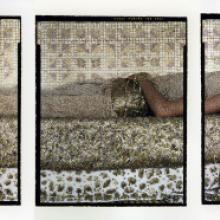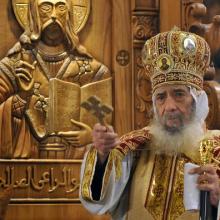Arab Spring

Zaituna Mosque, Tunis. Image via Tom Heneghan / RNS
Tunisia’s Ennahda movement, the most successful Islamist party to emerge from the Arab Spring revolts early in this decade, has renounced political Islam and declared it will operate in the country’s politics as “Muslim democrats.”
A party congress over the weekend in the beach resort of Hammamet voted almost unanimously to drop Ennahda’s traditional religious work and participate in Tunisian politics as a regular political party.
Church leaders in Libya remain hopeful that Christians in the mostly Muslim country will be allowed to practice their faith, even as the country appears to be moving towards Shariah law.
In December, Libya’s General National Congress voted to make Shariah the source of all legislation and institutions. The vote came amid international concerns over the diminishing Christian populations in North Africa and the Middle East, and increased Islamist influence in countries engulfed by the Arab Spring revolution.
Libya has undergone a two-year transition since 2011 when demonstrations toppled Moammar Gadhafi. Before the revolution, Christians were granted religious freedom, but with the change of power, they have been arbitrarily arrested, attacked, killed, and forced by the Islamist groups to convert to Islam.
An Iraqi woman dons a black hijab but bares her thighs. A Lebanese woman wearing a sheer blouse curls up on a bed, both innocent and seductive. An attractive young Iranian couple shares breakfast at a small table, seemingly oblivious to the tank looming just a few yards away.
There are no harems, belly dancers, or male oppressors in this photography show, nor any of the other Middle Eastern stereotypes that Westerners generally associate with that far away, often misunderstood, region.
“She Who Tells a Story,” a photo exhibit now showing at Boston’s Museum of Fine Arts and headed to other U.S. museums, features the work of 12 women from the Middle East who shatter stereotypes with works that are provocative, beautiful, mysterious, and surprising, all at the same time.
People who hoped the Arab Spring would lead to greater religious freedom across the Middle East have been sorely disappointed, and a new Pew study confirms that the region has grown even more repressive for various religious groups.
“In 2011, when most of the political uprisings known as the Arab Spring occurred, the Middle East and North Africa experienced pronounced increases in social hostilities involving religion, while government restrictions on religion remained exceptionally high,” according to the report by the Pew Research Center.
The study shows the number of countries in the Middle East or North Africa with sectarian or communal violence between religious groups doubled from five to 10 during 2011, a year that coincided with most of the political uprisings of Arab Spring.
Editor's Note: The following is a transcript of President Barack Obama's remarks to the UN General Assembly in New York City on Tuesday, in which he condemns global violence and extremism, framing the speech around the recent tragedy at the U.S. consulate in Libya.
THE PRESIDENT: Mr. President, Mr. Secretary General, fellow delegates, ladies and gentleman: I would like to begin today by telling you about an American named Chris Stevens.
Chris was born in a town called Grass Valley, California, the son of a lawyer and a musician. As a young man, Chris joined the Peace Corps, and taught English in Morocco. And he came to love and respect the people of North Africa and the Middle East. He would carry that commitment throughout his life. As a diplomat, he worked from Egypt to Syria, from Saudi Arabia to Libya. He was known for walking the streets of the cities where he worked -- tasting the local food, meeting as many people as he could, speaking Arabic, listening with a broad smile.
Chris went to Benghazi in the early days of the Libyan revolution, arriving on a cargo ship. As America’s representative, he helped the Libyan people as they coped with violent conflict, cared for the wounded, and crafted a vision for the future in which the rights of all Libyans would be respected. And after the revolution, he supported the birth of a new democracy, as Libyans held elections, and built new institutions, and began to move forward after decades of dictatorship.
Chris Stevens loved his work. He took pride in the country he served, and he saw dignity in the people that he met. And two weeks ago, he traveled to Benghazi to review plans to establish a new cultural center and modernize a hospital. That’s when America’s compound came under attack. Along with three of his colleagues, Chris was killed in the city that he helped to save. He was 52 years old.
The fate of Copts looks as tenuous as ever as Egyptians struggle to determine who won this weekend's first-ever democratic presidential elections. Presented with what many saw as a lose-lose proposition, Egyptians had a choice between Ahmed Shafiq, former prime minister of ousted leader Hosni Mubarak, or Mohammed Morsi of the Muslim Brotherhood, who many fear will turn the country into an Islamic state.
Though final results are not yet in, the Muslim Brotherhood has projected its candidate as the winner. Within hours, Egypt’s military caretaker government, which is seen as sympathetic to Mubarak's old regime, issued an interim constitution that granted itself broad power.
Carl Moeller, who leads the Southern California-based Open Doors USA, an organization that works with persecuted Christians worldwide, estimates that approximately 100,000 Coptic Christians abandoned the country for the U.S. or Europe last year following the turbulence of the Arab Spring and attacks on Coptic churches.
Pope Shenouda led what many would call a biblical and spiritual life — the heartbeat of this ancient church. He loved the Bible, studying it thoroughly, memorizing vast passages, and teaching classes on its content — something unusual in the practices of this liturgical church. After becoming Pope in 1971, for many years he would teach from the Bible on a weekday night (I think it was always Wednesday) in St. Mark’s Cathedral in Cairo. He would schedule his world travels to be back in time for these Bible studies. The cathedral would be packed, and Pope Shenouda would patiently answer the questions raised by those coming to listen and learn.
When I first met Pope Shedouda in 2004, I was general secretary of the Reformed Church in America, leading a denominational delegation to the Middle East. At the close of our “audience” — a time of rich conversation — I presented him with a small travel Bible which had been printed by the RCA. It was the NRSV translation. He took it gracefully, but immediately looked up a particular verse in the New Testament that was of concern, and promptly announced that the NRSV’s translation was inaccurate.
The Bible Society of Egypt, which loved Pope Shenouda’s biblical emphasis, is using the occasion of his funeral this week to reach out to the society. Pope Shenouda’s call to ministry came in 1945, when he read a passage from the Bible in the window of a bookstore of the Bible Society of Egypt. The organization has prepared a pamphlet summarizing his life and love of the Scriptures, and printed 1,000,000 copies for distribution.
Today’s funeral will provide a focus of national attention of the extraordinary life of this church leader.
U.S. Top Destination for Christian, Buddhist Immigrants, Study Saysl; Abdo Husameddine, Syria Deputy Oil Minister, Defects; Washington’s New Antiwar Movement; The Pentagon's (Preliminary, Shaky, And Hypothetical) War Plan For Syria; Arab Spring Fails To Allay Women's Anxieties; Progressives Petition Hoyer Against Safety Net Cuts; Carbon Fast 2012: Christians Give Up Carbon For Lent
Demonstrations Whisper Of An Arab Spring In Jordan; Perfect Storm Threatens Long-Term Unemployed; Obama: Birth Control Policy Meets Everyone's Needs; Will Inequality Keep Getting Worse?; What Davos, Occupy Have In Common; On Immigration, 'Amnesty' Isn't A Four-Letter Word (OPINION); In Year Of Uprisings, Reporters Brave Crackdowns From Wall St. To Tahrir Square (OPINION).
CAIRO, Egypt — From her home, Samia Ramsis holds a key chain bearing the face of the Virgin Mary as visitors outside come to look upon the spot where Egypt's Coptic Christians believe Mary, Joseph and the infant Jesus found refuge after fleeing Bethlehem.
Once crowded with Christians, Cairo's Coptic quarter where she lives with her husband, Mounir, and two children is now home to fewer than 50 Christian families.
"We know many Christians have left," said Mounir Ramsis, speaking not only about this quarter but about all of Egypt. "But we love this country and will stay until death."
The Arab Spring uprisings that toppled secular dictatorships have unleashed long-suppressed freedoms that have allowed Islamic parties to gain a share of political power they have been denied for decades. Their rise is creating near-panic among ancient Christian communities that dot the Muslim world and predate Islam by centuries.

Tahrir Square, November 2011. Image via Wiki Commons http://upload.wikimedia.org/wikipedia/commons/0/00/Tahrir_Square_on_Novembe
Today is one year to the day since protestors massed in Cairo's now-legendary Tahrir Square. Inspired by events in nearby Tunisia, hundreds of thousands of Egyptians called on their leader, Hosni Mubarak, to step aside and allow democratic reform to take place. The country, the city, the square, were (and remain) icons for what has become known as the Arab Spring.
The protests that began a year ago brought down a government that for too long had failed to care for its citizens in a manner that was good, decent and just. But in the time since, Egypt has walked a difficult path. How are Egyptians marking this poignant anniversary, how do they feel about the changes that have occurred, and what are their hopes for the years to come?
Here’s a round-up of some of the best insights into these questions from around the world:







